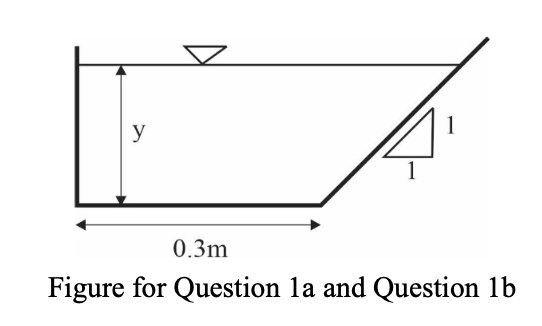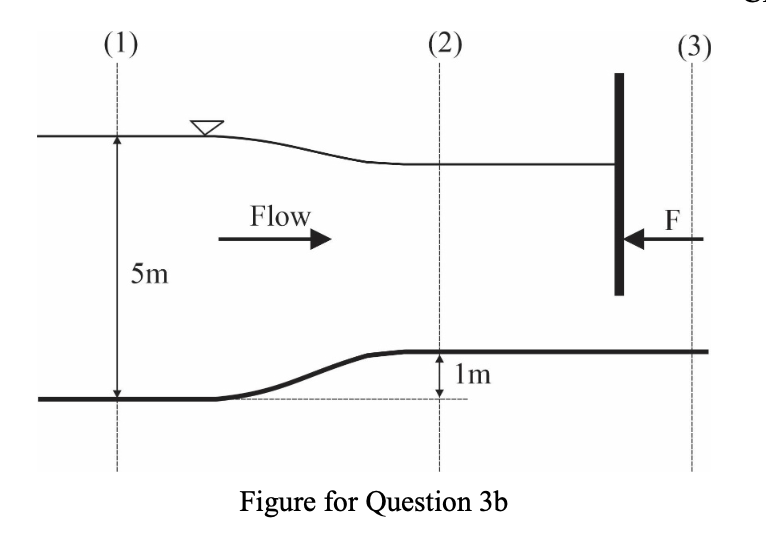🍐 我们总结了新西兰代写中—— 工程代写的经典案例,如果你有任何Environmental Engineering代写的需要,可以随时联络我们。CoursePear™ From @2009。
SECTION A: OPEN CHANNEL FLOW (40 marks)
The figure below shows a stormwater gutter (‘the channel’) for a commercial building. The channel ends at a downpipe, which you can assume to be a vertical drop. The slope of the channel is 0.0004, Manning’s n is 0.010 and the critical depth in the channel is yc = 0.2m.

Figure for Question 1a and Question 1b
1. (a)
(b) Using the Step Method, determine the distance from the point at which y = 0.3 m to
2.
3. (a)

the corresponding circle, where R is circle radius.
(6 marks)
(b) The flow in the rectangular channel shown in the figure below is q = 10 m2/s. The head loss at the gate is 70% of the velocity head at (2). Calculate the force F.
(7 marks)
Page 2 of 5
CIVIL 302
Determine the flow depth for uniform flow. the downpipe.
The flowrate in a wide rectangular channel is q = 12 m2/s. The channel slope changes from 1:4000 in Section 1 to 1:120 in Section 2, and n = 0.015. Section 1 is upstream from Section 2. Find the distance between the points on each section of the channel where y = 3.5m.
(14 marks)
A hydraulic jump forms in a circular tunnel of diameter 2 m. The upstream flow depth is 1 m and the flow downstream of the jump just reaches the top of the tunnel, i.e. the downstream depth is 2 m. Determine the flowrate, Q.
Note that the centroid of a semicircle is located a distance 4R/3π from the centre of
(6 marks) (7 marks)
Figure for Question 3b
Page 3 of 5
CIVIL 302
SECTION B: HYDROLOGY (40 marks)
4. (a) In the project you recommended a preliminary estimate of Q50 at a bridge site. In the next detailed design phase of the project, what advice would you give to the engineer who needs to come up with a more accurate estimate, considering the bridge will not be replaced for another 100 years?
(4 marks) (b) What is the probability of the bridge experiencing the Q50 flood flow during the 100-
year intended lifespan?
(c) If a dam was to be constructed somewhere in the catchment upstream of the bridge,
how could you expect the rating curve at the bridge site to change?
(2 marks)
5. (a) The following annual maximum floods were recorded over 20 years at a river site. What is the maximum return period flood (in years) that we can estimate has occurred over this time?
CIVIL 302
(2 marks)
Year Q (m3/s) Year
- 2002 41 2012
- 2003 54 2013
- 2004 83 2014
- 2005 37 2015
- 2006 22 2016
- 2007 24 2017
- 2008 60 2018
- 2009 45 2019
- 2010 43 2020
- 2011 21 2021
Q (m3/s)
52
83
31
87
87
28
100 68 87 75
(4 marks)
(b) It was later suggested that the maximum flow recorded in 2011 was incorrectly read from the rating curve. What effect could this error have on: (i) your answer in Question 5a, and (ii) if you were to use these records to estimate another return period event (such as Q10)?
(4 marks)
(c) Describe the steps that you would need to take to validate this rating curve in the
field.
(2 marks)
Page 4 of 5
6. (a)
(3 marks) The 2-year depth-duration-frequency equation for Albert Park is given by
P2 year, D= 92.96D D0.735+0.037
where D is the duration in days and D ≤ 2 days.
Using the above depth-duration-frequency equation and the alternating block method, develop and sketch a 1-hour design rainfall storm hyetograph using a 15-
(d) If such long term flow records did not exist at the site, what method would you
recommend to estimate different flood return period flows?
(b) climates?
(c) It has been proposed that Albert Park (predominantly good condition urban lawns) could be developed for further university buildings. What impact would this urbanization
have on the hydrology of the stormwater catchment?
(3 marks)
7. Determine the 2-year peak flow using the TP108 method for a catchment located in Clevedon, South of Auckland with the following properties:
Pervious area: 100 ha predominantly pasture with 25% unconnected impervious area
Impervious Area: 25 ha
Catchment slope using the equal-area method: 0.01 Catchment length along the main channel: 1.2 km Soil type: Group B
(9 marks)
Page 5 of 5
CoursePear™是一家服务全球留学生的专业代写。
—-我们专注提供高质靠谱的美国、加拿大、英国、澳洲、新西兰代写服务。
—-我们专注提供Essay、统计、金融、CS、经济、数学等覆盖100+专业的作业代写服务。

CoursePear™提供各类学术服务,Essay代写,Assignment代写,Exam / Quiz助攻,Dissertation / Thesis代写,Problem Set代做等。
